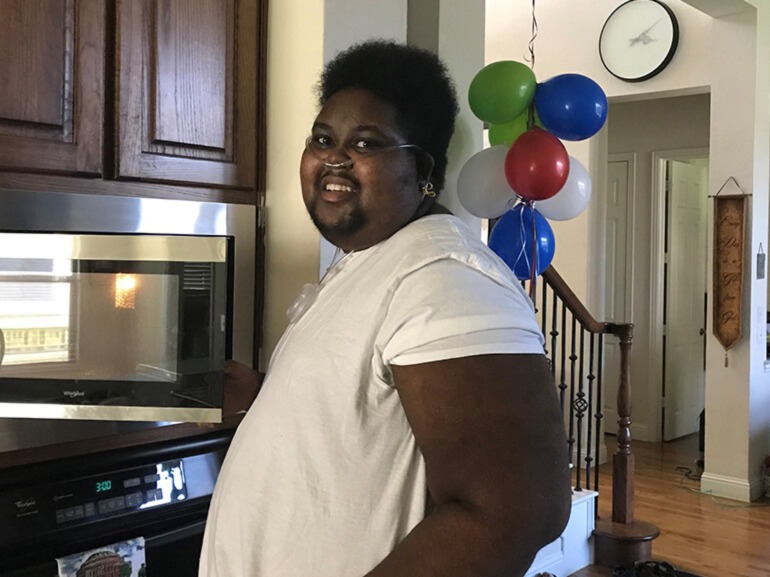Eli's Story

COVID-19
Gideon “Eli” Crentsil was diagnosed with COVID-19. The 22-year-old was admitted to a local hospital, then moved to a long term-care facility where his condition continued to deteriorate. Eli was transferred to Baylor University Medical Center, part of Baylor Scott & White Health, where doctors placed him in a medically-induced coma. They performed a tracheostomy to help him breathe, inserted a feeding tube and hooked him to an extracorporeal membrane oxygenation (ECMO) machine, a last-chance treatment that oxygenates blood and pumps it through the body, allowing the heart and lungs to rest.
Miraculously, the ECMO worked. Eli slowly began to improve, but his condition remained serious. After nearly three months, Eli transferred to Select Specialty Hospital - Dallas Downtown for intravenous antibiotics, tracheostomy and feeding tube management/removal and physical and occupational therapies.
A physician-led team of nurses, therapists and other clinicians created a plan to help Eli heal. This included respiratory therapists and critical care physicians who helped him progress to the point where a speaking valve could be attached to the tracheostomy, enabling him to talk. Eli also worked with the speech therapy team to successfully complete a swallow study and begin the transition to eating food.
Prolonged hospitalization left Eli extremely weak and requiring assistance with basic self-care tasks. His Physical and occupational therapists crafted a personalized mobility program, using small movements to retrain core muscles and slowly build his strength and stamina, and factoring in rest periods as needed. Four weeks later, Eli was able to participate in three hours of daily therapy.
His family chose Baylor Scott & White Institute for Rehabilitation (BSWIR) – Dallas for the next phase of his recovery. Eli knew he still had a long road ahead, but was determined to reclaim his life. His physician-led team of doctors, rehabilitation nurses, physical, occupational and respiratory therapists and others tailored a treatment plan help him succeed.
One of Eli’s first goals was to sit in a chair, which he hadn’t been able to do for months. However, Eli was unable to stand and needed three people to help him out of bed. With the guidance of his physical therapists, he learned to use a transfer board to move independently from the bed to his wheelchair.
Because of the damage to his lungs, Eli still required high flow oxygen. Physical exertion left him breathless, but he remained undeterred. Though it was challenging, he never lost his focus: to walk, return home to his family and friends and resume his life. The positive relationship Eli developed with the treatment team was key. “I felt like I was working with friends, not just therapists,” he recalled.
Eli found that progress took time, and some days were tougher than others. “Realizing it is okay to not always have a good day and letting them help me through it was a lesson I had to learn,” he said.
Coordinated medical, nursing and therapy services, combined with Eli’s hard work and perseverance, fueled his progress. By the time of discharge, he was able to stand, perform self-care and other daily activities independently and walk with supervision using a walker. Eli admits that his last day of therapy was bittersweet, saying, “I’m incredibly grateful to everyone. I was told Baylor was amazing ... and now I can say miracles really do happen here.”
Eli continues to aim for a full recovery. He is participating in BSWIR’s unique Real Life Rehab program, which provides the skills and strategies to adjust to life at home and in the community, and plans to go on to outpatient therapy.